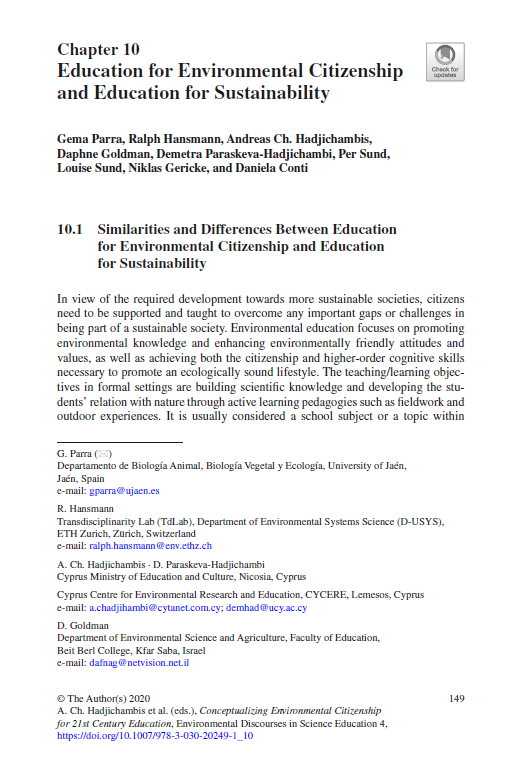Gema Parra, Ralph Hansmann, Andreas Ch. Hadjichambis, Daphne Goldman, Demetra Paraskeva-Hadjichambi, Per Sund, Louise Sund, Niklas Gericke, and Daniela Conti
Abstract:
In order to achieve a sustainable society, a citizen must be supported in overcoming any important gaps or challenges. Preparing people for Environmental Citizenship and Education for Sustainability shows coincidences in some dimensions and differences in others. However, within its definition, Environmental Citizenship has a strong emphasis on the environmental dimension of sustainability and on civic engagement in the private, social and political sphere. Environmental Citizens are able to exercise their environmental rights and duties, are able to identify the underlying structural causes of environmental degradation and environmental problems and have the willingness and the competences to address critical and active engagements. They act individually and collectively within democratic means, and consider inter- and intra-generational justice. Education for Environmental Citizenship is relevant because it can strengthen the achievement of sustainability goals through a more active civic participation. Education for Environmental Citizenship needs to develop the dispositions, skills and competencies that will enable students to reach this level of environmental awareness with wider spatial and temporal scopes, using specific educational approaches and methodologies that promote these qualities in individuals. Robust Education for Environmental Citizenship to enhance governance skills can contribute to the effective safeguarding of the environment as a holistic entity that encompasses natural, societal and economic dimensions.
Μπορείτε να βρείτε εδώ περισσότερες πληροφορίες για την πιο πάνω δημοσίευση
 Κυπριακό Κέντρο Περιβαλλοντικής Έρευνας & Εκπαίδευσης – Κυκπεε
Κυπριακό Κέντρο Περιβαλλοντικής Έρευνας & Εκπαίδευσης – Κυκπεε



